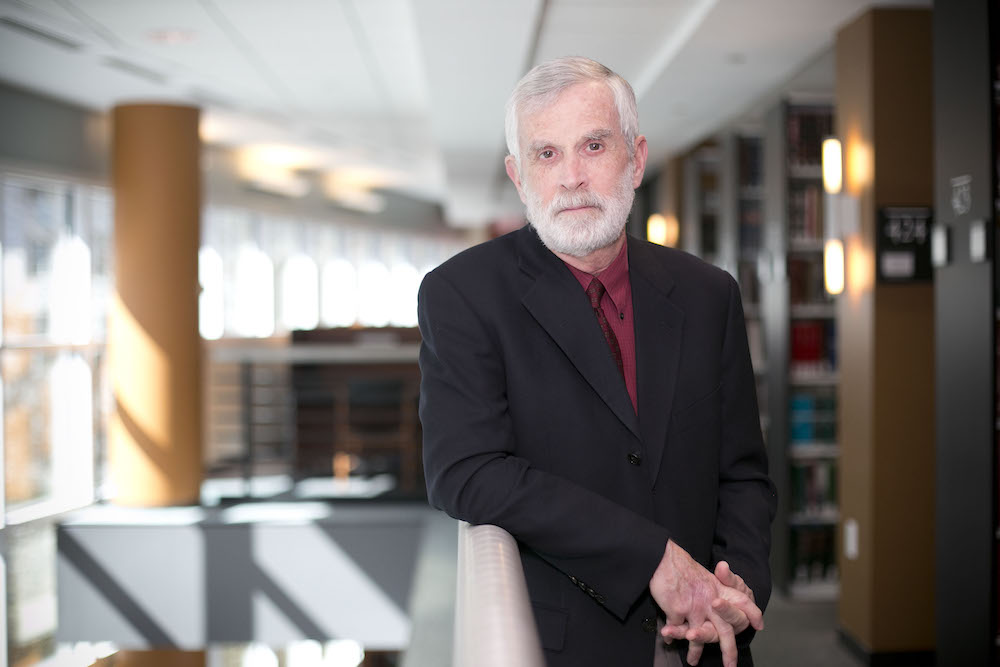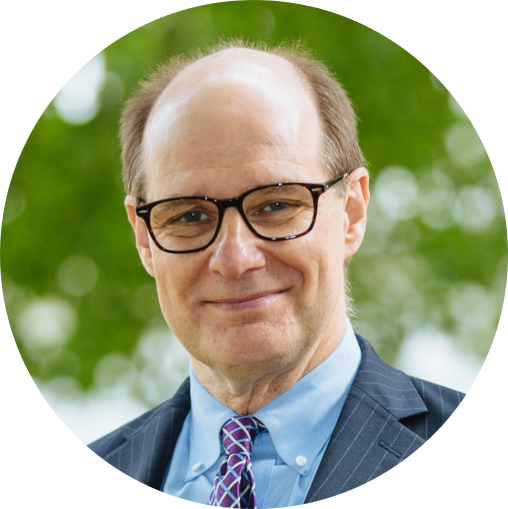
Celebrating the Scholarship of Michael J. Perry
Forward by John Witte, Jr.
The following text is an excerpt from the Emory Law Journal’s new Festschrift honoring the scholarly work of Michael J. Perry, who serves as Woodruff Professor of Law at Emory Law School and Senior Fellow at the Center for the Study of Law and Religion. In the “Foreword” to that issue, John Witte Jr. highlights key themes and contributions of Prof. Perry’s distinguished career, ranging from human rights to the intersections of law and religion, and much more.
The special issue of the Emory Law Journal in which this foreword is published can be found online at: https://scholarlycommons.law.emory.edu/elj/vol71/iss7/.
“I’ll give $10,000.” That was Michael Perry’s instant response in 2011 to my request to contribute to a memorial fund for a recently fallen colleague. Our late colleague, David Bederman, was a rapidly rising superstar on the Emory Law School faculty who had just died in the prime of life after a seven-year illness. “That’s a princely gift,” I responded, knowing that Michael was decently paid but not rich. “Yes, but that’s what the spirit of justice, love, and brotherhood demands,” he replied. The next morning, his $10,000 check crossed my desk with a small note affixed: “Thank you for inviting Sarah and me to contribute.” Inspired in part by Michael’s generosity, three dozen faculty and friends made comparable contributions, yielding a half-million-dollar Bederman Memorial Fund before the month was out.
This was vintage Michael J. Perry. On full display in this brief exchange was his characteristic empathy for the needs and suffering of others and his generous charity in response. This same empathy has him supporting all manner of worthy causes at Emory Law School that cater to the needs of the disadvantaged — the Emory Public Interest Committee, the Black Law Students Association, the Public Defenders Program, the Barton Center for Child Advocacy, the Atlanta Legal Aid Society, and many other groups. On full display, too, in this exchange was Michael’s insistence on doing the big things in life — including writing big checks — in solidarity with his beloved wife Sarah. Michael is a consummate family man, a loving supporter of Sarah’s career and their two sons’ precocious rise to elite professions, a loyal caretaker for ailing family and friends near and far. Family and friendship, empathy and charity, hugs and hospitality are among his abiding gifts. To be with Michael Perry is to be loved.
This love reflects Michael’s life-long faith. This is not only his Roman Catholic faith and belief in the eternal commandments to “love God, neighbor and self,” and to “do unto others as you would have done unto you.” It is also Michael’s political faith in the moral virtues that make human civilization possible and better: the virtues of “justice, love, and brotherhood,” yes, but also the virtues of dignity, liberty, equality, peace, wisdom, prudence, moderation, truth-telling, and more. Michael has an abiding faith that these religious beliefs and moral virtues can be properly balanced and productively integrated in a democratic society. But that works only if a society is dedicated to the constitutional rule of law, the protection of human rights for all, and the encouragement of health, education, and welfare for everyone — especially the classic “poor, widows, orphans, and strangers” as well as those many millions of desperate souls in our day who are imprisoned, trafficked, addicted, abused, starved, deserted, deprived, or discriminated against.
Michael has worked out this faith not only in his daily charitable habits but also in his scholarly work. “Faith without works is dead,” he likes to remind this Protestant, quoting the Bible. And, my goodness, he has done a lot of scholarly work over his law teaching career of nearly forty years and counting. Michael has published some ninety book chapters and scholarly articles. In addition, thirteen closely-reasoned and tightly-written monographs have his distinguished name on the spine, all published with major university presses: The Constitution, the Courts, and Human Rights (Yale, 1982); Morality, Politics, and Law (Oxford, 1988); Love and Power: The Role of Religion and Morality in American Politics (Oxford, 1991); The Constitution in the Courts: Law or Politics? (Oxford, 1994); Religion in Politics: Constitutional and Moral Perspectives (Oxford, 1997); The Idea of Human Rights: Four Inquiries (Oxford, 1998); We the People: The Fourteenth Amendment and the Supreme Court (Oxford, 1999); Under God? Religious Faith and Liberal Democracy (Cambridge, 2003); Toward a Theory of Human Rights: Religion, Law, Courts (Cambridge, 2007); Constitutional Rights, Moral Controversy, and the Supreme Court (Cambridge, 2009); The Political Morality of Liberal Democracy (Cambridge, 2010); Human Rights in the Constitutional Law of the United States (Cambridge, 2013); and A Global Political Morality: Human Rights, Democracy, and Constitutionalism (Cambridge, 2017).

The titles of his books mark the main themes of his scholarly pilgrimage. Constitutional law, judicial review, constitutional interpretation, separation of powers, law and religion, religion and politics, law and morality, liberal democracy, and human rights at home and abroad — these have been his main scholarly fields. And within these writings he has returned again and again — with fresh insights and evolving arguments — to the most vexed legal and political issues of the past forty years: abortion, capital punishment, contraception, equal protection, religious freedom, domestic privacy, same-sex liberty, moral freedom, and the place of religion and belief in public life, in political deliberation, in legislative debate, in judicial decision-making, and in interdisciplinary scholarship.
Some of Michael’s articles have been downloaded thousands of times from various scholarly websites. Most of his books are still in print. His first book was translated into Japanese; two others came out in Chinese editions. Three of his books have attracted journal symposia involving several senior scholars. And many of his books and articles have informed and been informed by Michael’s law school courses over the years, most notably Constitutional Law, Law and Religion, Law and Morality, International Human Rights, and the Jurisprudence of Human Rights.
Michael’s last five books and his last two dozen articles have been published during his tenure as the Robert W. Woodruff University Professor at Emory University. A Woodruff Professorship is the highest honor Emory University bestows on a member of its faculty — an honor already bestowed on two Emory Law School giants: Harold J. Berman in 1985 and Martha Albertson Fineman, who came to Emory the same year as Michael in 2003. Michael is also a Senior Fellow at Emory University’s Center for the Study of Law and Religion, and he serves as a co-editor of the Center’s Journal of Law and Religion published by Cambridge University Press. Before coming to Emory, Michael taught at Ohio State University College of Law (1975–1982); at Northwestern Law School (1982–1997), the last seven years as the inaugural Howard J. Trienens Chair in Law; and at Wake Forest University as the University Distinguished Chair in Law (1997–2003). Michael has also taught as a visiting professor of law at Yale, Tulane, New York Law School, the University of Tokyo, the University of Alabama, the University of Western Ontario, the University of Dayton, and the University of San Diego. He has given dozens of named public lectures around the country and well beyond.
My colleagues and I at Emory Law School and in the Center for the Study of Law and Religion are delighted to present this Festschrift to Michael and to the world of scholarship. The scholars who have contributed so generously to these pages represent the main disciplines across which Michael’s interdisciplinary energies have carried him — law, ethics, theology, history, philosophy, politics, and international studies. All the authors celebrate the warmth and generosity of Michael’s character and the oft poignant ways he has touched their lives and work. All speak to the depth of his scholarly originality and courage in addressing the signature issues of our day with acuity and honesty. All note the prodigiousness of his research that spills out in massive footnotes bristling with all manner of citations and quotations. Many articles also express appreciation for Michael’s willingness to hear criticism, to read more to deepen his understanding, to adjust his arguments where needed, and to take up new questions. The “Early Perry” and the “Contemporary Perry,” in Daniel Conkle’s apt words, show up in several articles. These two Perrys are both praised and challenged by several contributors herein, particularly Laura Underkuffler and Nicholas Wolterstorff. Such criticism is not only a mark of deep scholarly respect and verisimilitude but also an invitation for Michael to remain part of the scholarly conversation that he has led with such alacrity over the past forty years. Brace yourself for Perry’s parries of his critics!
We are deeply grateful to these authors for sharing their time and talents with us so generously. Not all invitees to this Festschrift were able to submit articles and will find their own ways of honoring Michael. Not all articles prepared for this Festschrift appear in these pages. Regrettably, one invited author took exception to the editors’ preliminary edits and suggestions and pulled his article in protest. Two additional authors pulled their articles in solidarity with the protesting author. Their decisions spilled out into some rather heated invective in various media against the Emory Law Journal and its editors.
With respect, a celebratory volume in honor of a great scholar is not the right place for such invective. I am as passionate an advocate for free speech and academic freedom as anyone, and indeed have written at some length — including in the Emory Law Journal — about the historical foundations and enduring fundamentals of these prized liberties. Like others, I subscribe to the classic view that the best antidote to bad speech is good speech, not censorship; and that true academic freedom entitles, sometimes demands, professors to speak and write with, above, and sometimes against current conventions. But journal editors and publishers have their academic freedom, too, and they can make decisions to reject articles out of hand, or as here offer polite explanations for why they are inviting an author to revise and resubmit. Of course, we scholars do sometimes protest such criticisms and editorial decisions. But such protest could have been made without casting a shadow on this celebratory volume. And so, with no disrespect intended, let us push that shadow aside. Allow me to celebrate and congratulate my dear friend, brother, and colleague, Michael J. Perry, for his remarkable life and work. Allow me to thank Dean Mary Anne Bobinksi and her decanal team for their kindness in sponsoring and supporting this celebration, and my Center colleagues, Amy Wheeler, Justin Latterell, and John Bernau for their hard work in assembling this distinguished collection of articles. And allow me to express my heartfelt gratitude and admiration for the Emory Law Journal editors — Editor in Chief Danielle Kerker Goldstein, Executive Articles Editor Shawn Ren, and their colleagues — who have so kindly taken on the extra work of creating this extra issue in honor and celebration of one of Emory Law School’s greats. ♦

John Witte, Jr., JD (Harvard); Dr. Theol. h.c. (Heidelberg), is Robert W. Woodruff Professor of Law, McDonald Distinguished Professor of Religion, and director of the Center for the Study of Law and Religion at Emory University. A specialist in Legal History, Human Rights, Religious Freedom, Marriage and Family Law, Law and Religion, he has published 280 articles, 17 journal symposia, and 35 books.
Recommended Citation
Witte Jr., John. “Celebrating the Scholarship of Michael J. Perry” Canopy Forum, August 2, 2022. https://canopyforum.org/2022/08/02/celebrating-the-scholarship-of-michael-j-perry/

